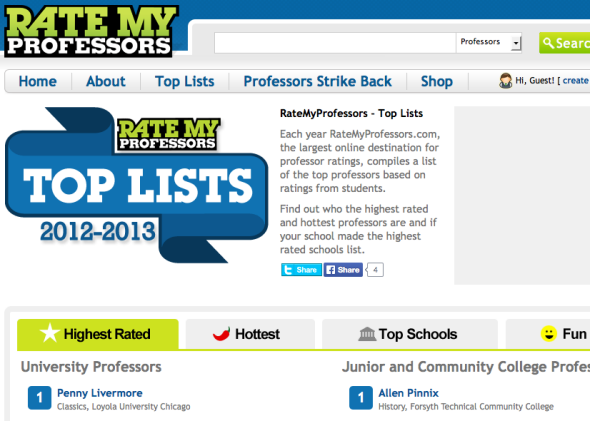This question originally appeared on Quora.
Answer by William B. Harrison III, English teacher:
I gave up most of my professorial indignation over Rate My Professors several years ago. It doesn’t really matter whether faculty like it. Just like the massive open online courses (MOOCs), we could not will it away if we wanted to. Now, maybe once a year but not on any schedule I look at my reviews to see what students have said. I smile when students say things like, “He’s nice, but don’t let him fool you. He grades hard!” It does not surprise me when they say, “He’s not the most organized professor.” One student said I shared too much of my personal life. I thought about it and made adjustments.
I suspect that sharing the fact that a professor is an easy A may backfire. When a slack reputation gets out, gets too wide and too deep, instructors tend to attract too many lazy, handout-seeking students. Often, the next thing that happens is that these instructors begin to feel hassled and bored with unresponsive classes. At some point, they tighten up in the classroom and in their grading. One of my favorite comments was posted to a graduate school professor of mine: “Easy B, tough A.” I could live with that.
I remind students that people’s careers are often made and broken based in part on their reputations. Although students can say whatever they want, blasting professors unfairly and when they do not really deserve it is a cheap shot, and students should consider that before they fire flaming arrows. I have been known to say on exam day, in my cheekiest tone, “If you liked the class, leave me a comment. If not, leave it alone.”
There are also various entertainments to be had on Rate My Professors, even for professors. A couple of scholars I know only from their books have have accumulated consistently lousy comments and ratings for their classroom work. (I never thought of “too busy to be polite” as a virtue.) I love the fact that one of my colleagues garnered a comment saying that “she’s kinda old, but when she gets enthusiastic about the material, she’s kinda sexy.” (Sidebar: It hurts me that I may not ever get my “hot” chili pepper. This rankles me deeply. Maybe I will hit the gym after all.) There is also the series of endless puzzles to be considered. Is there a real difference between a 4.6 and a 4.8 rating? Are my colleagues trending up or down? On one occasion, I did troll around for a while, spending too much time trying to answer such questions. And yes, professors who try to defend themselves in videos are amusing and come off as jerks or fools for engaging.
I do worry that what students seek is not always what is good for them, and I worry that sometime ratings on Rate My Professors might be used in instructor evaluations. The thought that tough, knowledgeable, fair teachers might be “dinged” in the promotion and tenure process simply because a number of students have been made unhappy and posted negative comments is simply not right. One school’s website slider photo of an instructor touted her “highest score on Rate My Professors two years in a row.” OK, she’s popular. What else you got? This sheer, unadulterated consumer model imported into higher education makes me and others cringe.
While the concerns over Rate My Professors make sense, most of the time I ignore it. I admonish students to seek good teachers rather than simply seeking easy teachers and to be fair when making comments. As an English teacher, however, I have an advantage: Students must write their opinions, and those who fail my class because they did not bother to show up and do any work embarrass themselves in the comments. The ones who vent are, invariably, the most inarticulate, spewing run-on sentences without regard to such niceties as appropriate use of capital letters and apostrophes. If it is unreadable, how can it be held against me?
More questions on College and University Faculty:
